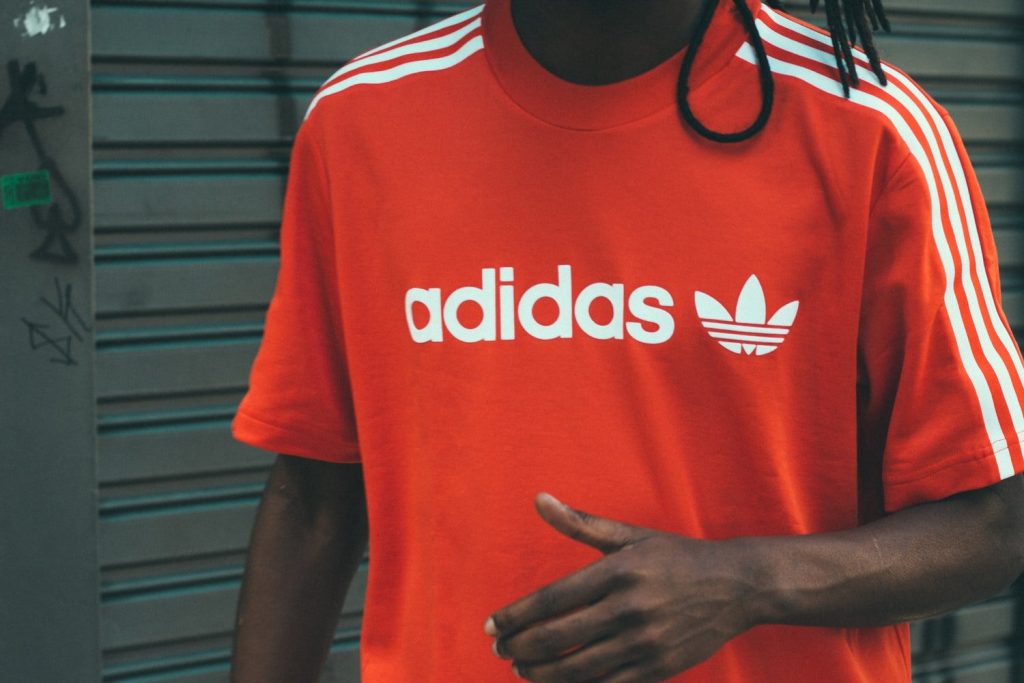Adidas made headlines in the summer of 2019 when it initiated legal proceedings against (pre-bankruptcy) J. Crew on the heels of the retailer filing a trademark application for registration with the U.S. Patent and Trademark Office for a multi-striped mark. In response to J. Crew’s application, adidas lodged a filing of its own: an opposition in which it sought to block the potential registration of J. Crew’s trademark on the basis that the striped motif is too similar to the three-stripe mark that it has been using on clothing and footwear for decades. While the opposition proceeding was temporarily suspended pending settlement talks between adidas and J. Crew, it is, nonetheless, noteworthy, as it is one of many stripes-centric actions that the German sportswear giant has taken over the years.
Behind adidas’ many lawsuits and legal endeavors is an aggressive practice that sees the 72-year-old sportswear titan police others’ unauthorized uses of stripes when it believes that such third-party uses are likely to confuse consumers and/or diminish the distinctiveness of its’ three-stripe marks and the ability of those marks to identify a single source in much the same was as the adidas name does. A read between the lines reveals that adidas’ legal squabbles are not limited to battles over trademarks; a hint of competition concerns appears to be at the heart of at least some of adidas’ enduring stripes fights, particularly as a growing number of companies – from high fashion entities like Thom Browne and Marc Jacobs to mass-market chains like Target – appear to be diversifying their offerings and expanding into adidas’ home turf, which is the sportswear/activewear market.
Putting adidas’s long-running enforcement efforts in perspective, the late Judge Garr King summarized in 2008 in an opinion in the case that adidas filed against the now-defunct Payless Shoes: between 1995 and 2008, alone, adidas had “pursue[d] over 325 infringement matters involving the three-stripe mark in the United States, filed more than 35 separate lawsuits for infringement of the three-stripe mark, and entered into more than 45 settlement agreements with companies selling infringing footwear.”
With that in mind, here is a look at some of the stripes-related legal matters initiated by – or otherwise involving – adidas in recent years …
Jun. 2021: adidas v. Thom Browne
Adidas is suing Thom Browne in the latest battle that it has waged over its famous three stripes. According to the trademark infringement and dilution complaint that it filed in a New York federal court on Monday, adidas claims that “despite Thom Browne’s knowledge of [its] rights in the famous three-stripe mark,” which adidas says that it has been using since as early as 1952, the New York-based fashion brand “has expanded its product offerings far beyond [its] formal wear and business attire speciality,” and is “now offering for sale and selling athletic-style apparel and footwear featuring two, three, or four parallel stripes in a manner that is confusingly similar to adidas’s three-stripe mark.”
Dec. 2020: adidas v. Thom Browne (Opposition)
Adidas has filed one of its latest three-stripe-specific trademark oppositions, and this time, Thom Browne is the sportswear giant’s opponent. On the heels of filing a number of requests this summer to extend the timeline for potential oppositions to the registration of a handful of Thom Browne trademark applications, adidas has lodged an oppositionwith the U.S. Patent and Trademark Office’s Trademark Trial and Appeal Board, urging the trademark body to put a stop to three pending trademark applications for a red, white, and blue stripe trademark for use on footwear, filed by Thom Browne.
According to the notice of opposition that it filed on December 14, counsel for adidas asserts that “notwithstanding [its] prior rights” in the three-stripe trademark, which it began using “over sixty-five years ago, when [it] first placed three parallel stripes on its athletic shoes,” and “well after [its] three-stripe mark became famous,” Thom Browne filed three intent-to-use trademark applications for a multi-stripe mark of its own.
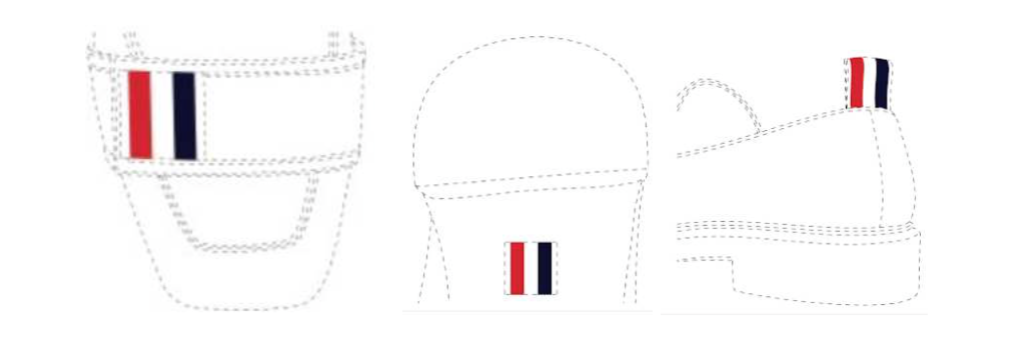
Dec. 2019: adidas v. Aviator Nation
According to the lawsuit that adidas filed in December 2019, Aviator Nation has “knowingly, willfully, intentionally, and maliciously adopted and is using confusingly similar imitations of [its] three-stripe mark … on apparel that directly competes with apparel offered for sale by adidas.” This is particularly problematic, adidas argues, given that it has “invested hundreds of millions of dollars [in] building” in connection with its brand, and given the parties’ history, which includes “continued attempts[s] to resolve this dispute without the need for litigation even after learning of these flagrant violations.”
Aug. 2019: adidas v. J. Crew
Adidas initiated a bid to shut down one of J. Crew’s recently-filed trademark applications, one in which the struggling retailer is seeking federal protections for a striped design for use on apparel ranging from tops and shorts to bowties and pajamas, as well as handbags, luggage, business card cases, and beach bags. According to the opposition that adidas filed in August, the sportswear brand asserts that it “believes that [it] will be damaged by the issuance of a registration” for a J. Crew multi-stripe trademark since it has been using its famous three-stripe trademark since “as early as 1952 … in the United States and worldwide.” As a result, adidas argued that “the three-stripe mark [has] come to signify the quality and reputation of adidas,” and thus, the U.S. Patent and Trademark Office should not register J. Crew’s mark.
On June 30, 2021 (and on the heels of a months-long suspension of proceedings in light of settlement negotiations between the parties), J. Crew withdrew its application “without prejudice,” according to a filing that counsel for the retail lodged with the TTAB.
Feb. 2019: Skechers v. adidas
Amid escalating behind-the-scenes tensions, Skechers filed suit against adidas in February, asking a California federal court to declare that despite adidas’s claims of infringement, it has not run afoul of the notoriously litigious German sportswear giant’s 3-stripe trademark by way of its 4-stripe Goldie-Peaks shoe. Skechers claimed that adidas sent it “infringement notice” letters towards the end of 2018, claiming that the “overall commercial impression” of its Goldie-Peaks shoe “is sufficiently similar to [its] 3-stripe” trademark-bearing shoes, and as a result, is likely to confuse consumers into believing that the Skechers shoe “is put out by, or with sponsorship or approval of, adidas.”
Skechers – which maintained that the protection that adidas’ maintains in its 3-stripe mark is “narrow” since the footwear and apparel industries are a “crowded field of stripe designs” – argued that adidas’s trademark infringement (and dilution) claims are “baseless,” as consumers are not likely to believe its sneakers are in any way associated with adidas due to “especially significant … visual distinctions” between the stripes on the shoe at issue and adidas’ trademark. In August 2019, adidas and Skechers settled the case five months after agreeing to arbitration.
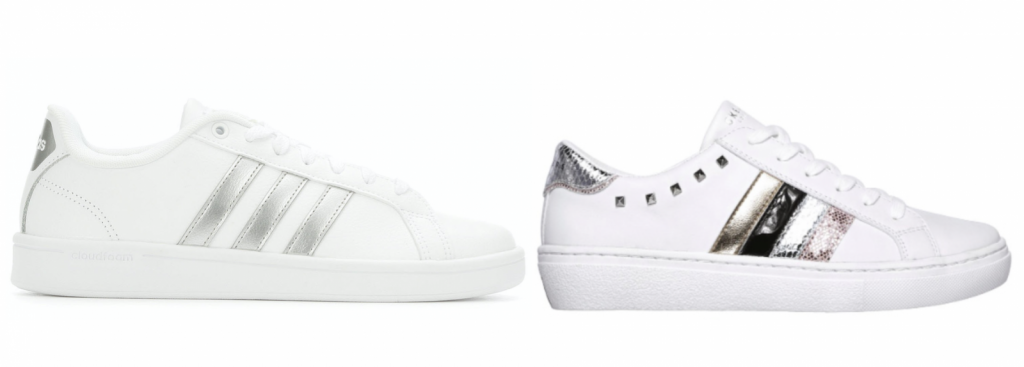
Mar. 2017: Forever 21 v. adidas
On the heels of Adidas filing – and subsequently settling– a trademark infringement suit against Forever 21 in 2015, the Los Angeles-based fast fashion retailer filed its own suit against adidas. In its complaint, which Forever 21 filed in the U.S. District Court for the Central District of California, the retailer alleged that it received “a letter dated February 24, 2017, [in which] Adidas’s counsel … threatened to sue Forever 21 over its use of stripes on six items of clothing.” According to Forever 21’s complaint, it “has fallen victim to Adidas’s threats [of trademark infringement-related litigation] on more than one occasion. Since 2006, Adidas has commenced a pattern of complaining about striped apparel sold by Forever 21, and it has steadfastly increased its threats to encompass virtually any item of clothing with decorative stripes.”
Within 10 days of Forever 21 filed suit, the parties had managed to settle the case out of court, and Forever 21 moved to voluntarily dismiss the case without prejudice, giving it the right to file a lawsuit on the same grounds at a later date.
Mar. 2017: adidas v. Juicy Couture
In furtherance of an early-2017 flurry of activity, adidas filed another trademark infringement suit, this time targeting Juicy Couture. According to adidas’ lawsuit, which was filed in federal court in Portland, Oregon, the home of its North American headquarters, adidas claimed that Los Angeles-based Juicy “intentionally adopted and used counterfeit and/or confusingly similar imitations of the Three-Stripe Mark.” Adidas asserted that Juicy sold stripes-bearing garments “knowing that they would mislead and deceive consumers into believing that the apparel was produced, authorized, or licensed by adidas, or that the apparel originated from adidas.” The Juicy garments that adidas took issue with: its Tricot collection pants and jackets, which bear stripes down the sleeves and pant legs.
The suit was settled in October 2017.
Feb. 2017: adidas v. Puma
Adidas filed suit against its then-Kering-owned rival Puma, claiming trademark infringement, unfair competition, trademark dilution, and deceptive trade practices in connection with 4-striped shoes being offered by Puma. According to adidas’ complaint, “Despite adidas’s longstanding rights in the Three-Stripe Mark, Puma began offering for sale a soccer cleat bearing a confusingly similar imitation of adidas’s Three- Stripe Mark.” Puma’s “use of four diagonal stripes on the side of the Infringing Cleat is a blatant attempt by Puma to trade on the goodwill and commercial magnetism adidas has built up in the Three-Stripe Mark and to free-ride on adidas’s fame as a preeminent soccer brand,” adidas asserted.
The sportswear giant alleged that the footwear “distributed, offered for sale, and sold by Puma is not manufactured by adidas, nor is Puma associated, affiliated, or connected with adidas, or licensed, authorized, sponsored, endorsed, or approved by adidas in any way.”
Adidas moved to voluntarily dismiss the case 11 days after it was filed.
Feb. 2017: adidas v. Tesla
In an interesting move, adidas initiated a trademark opposition proceeding against Tesla, asking the U.S. Patent and Trademark Office’s Trademark Trial and Appeals Board to block the Elon Musk-run automaker from federally registering the logo for its Model 3 sedan. The logo in contention consisted of three horizontal stripes that are similarly styled to the “E” in Tesla’s primary logo. The sportswear giant’s move to stop Tesla from receiving federal trademark protection for its horizontal three-stripe logo came shortly after Tesla sought to register its new trademarks in class 25, which covers “articles of clothing, namely, t-shirts, shirts, jackets, gloves, scarves, hats; headgear, namely, sports hats, caps, sun visors; hats for infants, babies, toddlers and children; infant and toddler one-piece clothing; infant wear.”
Within a week of adidas filing its opposition, Tesla withdrew its application for registration for the trademark.
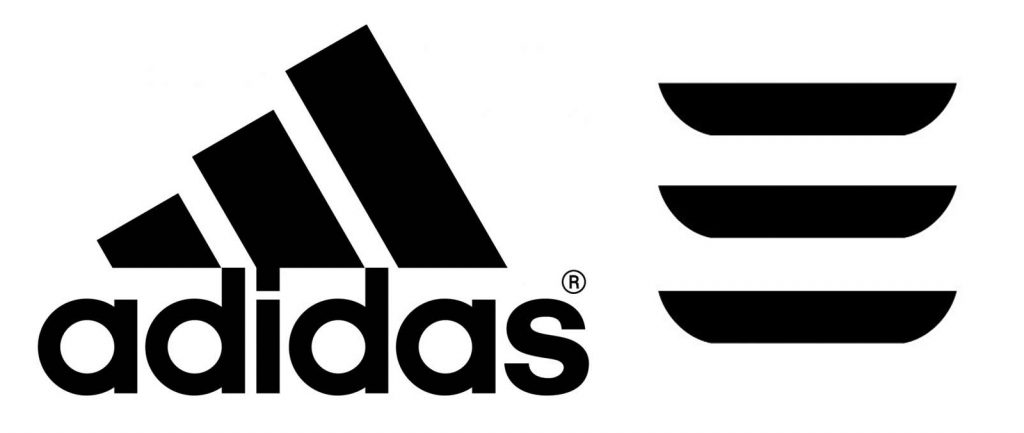
Oct. 2016: adidas v. FC Barcelona
In another proceeding before the USPTO’s Trademark Trial and Appeal Board, adidas took on Spanish soccer team, FC Barcelona. According to adidas’ opposition filing, FC Barcelona’s application for registration should be denied, as FC Barcelona’s mark – one that “consists of a square containing seven vertical stripes (the 1st, 3rd, 5th and 7th stripes from the left are blue, and the remaining three stripes are garnet)” – was far too similar to adidas’ own three-stripe trademarks.
FC Barcelona filed to register its seven-striped mark in May 2015, prompting adidas to oppose the registration, arguing that “the Three-Stripe adidas trademark is well-known and famous and has been for many years. It is particularly well known among professional soccer players, fans and consumers of soccer apparel.”
In February 2017, FC Barcelona withdrew its application, and the USPTO dismissed the opposition with applicant’s consent without prejudice.
Sept. 2016: adidas v. Bally Americas
The American subsidiary of Swiss luxury brand Bally found itself on the receiving end of a trademark suit filed by adidas in the fall of 2016. According to the complaint, adidas alleged that “despite Bally’s knowledge of adidas’s rights in the famous Three-Stripe Mark [and adidas’ many federally registered trademarks for it], Bally currently is offering for sale and selling footwear featuring two and/or three parallel stripes on the side of the shoe” with the goal of competing directly with adidas. Adidas alleged that Bally’s actions were particularly egregious, as they “demonstrate an intentional, willful, and malicious intent to trade on the goodwill associated with adidas’s federally registered Three-Stripe Mark to adidas’s great and irreparable injury.”
Adidas voluntarily dismissed its claims in July 2017, and Bally continues to sell an array of striped sneakers.
Apr. 2016: adidas v. Ecco USA
Ecco allegedly infringed its three-stripe trademark, adidas asserted in a trademark lawsuit in April 2016. According to its complaint, adidas claims that ECCO, a Danish shoe brand, “intentionally adopted and used counterfeit and/or confusingly similar imitations of the Three-Stripe Mark knowing that they would mislead and deceive consumers into believing that the [sneakers] were produced, authorized, or licensed by adidas, or that they originated from adidas. In its complaint, adidas claimed that ECCO’s three-stripe designs are “in blatant disregard of adidas’s rights.” Adidas also alleged that ECCO knew exactly what it was doing, as the brand’s actions demonstrate “an intentional, willful, and malicious intent to trade on the goodwill associated with adidas’s federally registered Three-Stripe Mark to adidas’s great and irreparable injury.”
Adidas voluntarily dismissed its claims in January 2018.
Mar. 2016: adidas v. APL
Adidas added another lawsuit over its famous three-stripe trademark to its line up in March 2016, this time against Athletic Propulsion Labs, LLC. In the complaint, adidas claimed that APL “intentionally adopted and used counterfeit and/or confusingly similar imitations of the Three-Stripe Mark knowing that they would mislead and deceive consumers into believing that the apparel was produced, authorized, or licensed by adidas, or that the apparel originated from adidas.” APL’s allegedly infringing shoes, which were being stocked by Revolve, Nordstrom, Shopbop, and other retailers, was “likely to cause confusion, deceive the public regarding its source, and dilute and tarnish the distinctive quality of adidas’s Three-Stripe Mark,” according to adidas.
In January 2017, the court, “having been informed by counsel for the parties that this action has been settled,” dismissed the case in its entirety.
Sept. 2015: adidas v. Skechers
Skechers is selling several “knock-offs” of its designs, including but not limited to one that is a bit too similar to its classic Stan Smith, adidas asserted in a lawsuit filed against the rival footwear company. Both Adidas’s Stan Smith and Skechers’ Onix style are constructed of white leather with perforations along the side and a green accent on the heel and tongue.
In May 2018, just ahead of the scheduled trial, the parties settled the case out of court. The settlement arrived after Adidas’ attorneys filed an emergency motion for contempt sanctions. Terms of the settlement were not disclosed.
Aug. 2015: adidas v. Forever 21
In a battle over fast fashion, adidas named Forever 21 in a lawsuit for allegedly infringing its three-stripe trademark. According to the lawsuit, Forever 21, as well as retailer Central Mills, “intentionally adopted and used counterfeit and/or confusingly similar imitations of the Three-Stripe Mark knowing that they would mislead and deceive consumers into believing that the apparel was produced, authorized, or licensed by adidas, or that the apparel originated from adidas. In addition to a request for a jury trial, Adidas wants Forever 21 to immediately and permanently cease all sales, distribution and marketing of the allegedly infringing garments, deliver the garments to Adidas so they can be destroyed and pay up a wide array of damages, which may be in the millions.
In November 2015, adidas filed to voluntarily dismiss the lawsuit without prejudice, signifying that the parties settled the matter amongst themselves out of court.
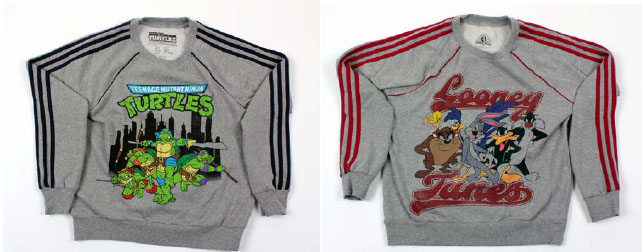
Jul. 2015: adidas v. Sears
Adidas continued its pattern of stripes-related litigation, filing a trademark infringement and dilution, and unfair competition suit against Sears Roebuck and Co., alleging that the retailer was offering up footwear bearing designs similar to its three-stripes trademark.
In January 2016, adidas filed to voluntarily dismiss the lawsuit.
Apr. 2015: adidas v. Marc Jacobs
In a lawsuit filed in Oregon federal court, adidas accused New York-based Marc Jacobs’ since-shuttered little sister line, Marc by Marc Jacobs, of infringing its famed three stripe trademark on garments from its Fall/Winter 2014 collection. According to the lawsuit, Marc Jacobs – by way of Marc by Marc Jacobs – tried to piggyback on the popularity of adidas’ iconic three-stripe design, with a “confusingly similar” four-stripe design. In addition to federal trademark infringement, adidas claimed federal and common law unfair competition, unfair and deceptive trade practices, and trademark dilution.
In June 2015, adidas filed to voluntarily dismiss the lawsuit.
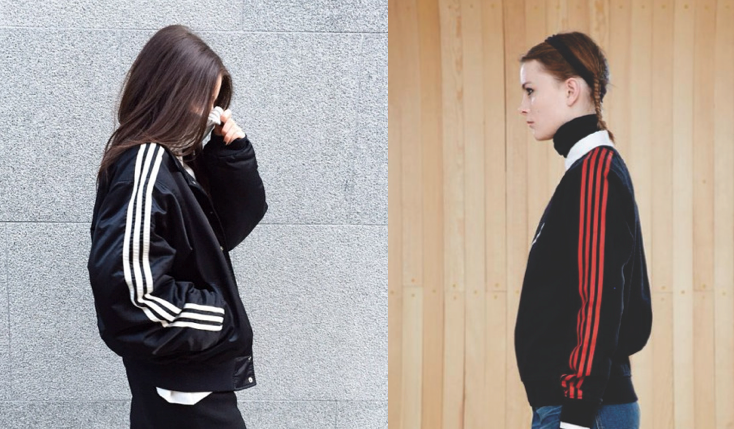
Oct. 2008: adidas v. Target
In a fight against Target, Adidas accused the big box retailer of infringing its three-stripe mark by way of footwear bearing two and four parallel stripes – again. In its complaint, adidas asserted that Target has violated more than one of the settlement agreements that they have entered into in connection with previously-filed trademark suits, including a February 2003 settlement in which Target agreed to refrain from selling infringing striped products.
Jan. 2005 – adidas v. Abercrombie
Just as Abercrombie was at the height of its success, adidas filed a trademark infringement suit against it, asserting that the mall retailer was selling garments, including pants and sweatshirts, bearing adidas trademark-protected stripe design, all of which was featured in Abercrombie’s online Christmas catalogue. The merchandise includes several pairs of pants as well as a zip-up sweatshirt.
This is hardly adidas’ first clash with Abercrombie. Court documents show that Abercrombie has been on the receiving end of cease and desist letters from the German sportswear giant as a result of its use of stripes on its young millennial-centric clothing. In both instances in the past, Abercrombie agreed to stop selling the allegedly infringing wares but refused to do so this time, prompting adidas to file suit.
Aug. 2004 – adidas v. Ralph Lauren
Ralph Lauren was on the receiving end of an adidas lawsuit in the summer of 2014. According to adidas’ complaint, Ralph Lauren – by way of a jacket sold in its Polo collection – made use of its three-stripe mark without authorization. The two stripes running down the sleeve of a Polo jacket bore too similar a resemblance to adidas’ mark, the sportswear co. argued, thereby, likely giving rise to confusion amongst consumers. In addition to seeking monetary damages, adidas asked the court to force Ralph Lauren to recall all of the stripes-bearing jackets from stores, and immediately discontinue ay advertising that included the jackets.
Nov. 2001 – adidas v. Payless
In one of the most talked-about cases that adidas has filed to date, the sportswear giant filed suit against Payless Shoesource for trademark infringement and dilution, among other claims, for offering a shoe bearing three stripes (and also one that mirrors the trade dress of adidas’ Superstar style shoe). The case was initially dismissed by the district court on the basis that a 1994 settlement agreement between adidas and Payless prevented adidas from filing a number of claims in its subsequent lawsuit, but the Ninth Circuit Court of Appeals, siding with adidas, reversed the lower court’s decision and found that the trademark infringement claims cannot be precluded when the allegedly infringing activity started after the agreement was finalized.
The case was remanded back to the district court for trial. Upon conclusion of the trial, a jury awarded adidas $30.6 million in actual damages, $137 million in profits that Payless made from selling the fringing footwear, and $137 million in punitive damages in connection with its trademark infringement, trade dress infringement, and dilution claims. A judge later reduced the award to $65 million.
This article was initially published in October 2019 and has been updated accordingly.




